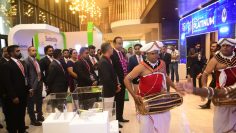Leading Cement Brands Come to Settlement Over Trade Mark Dispute
Tokyo Cement Company (Lanka) PLC agreed to a settlement over a suit filed against Ruhunu Lanka Cement (Pvt) Ltd in the Commercial High Court of the Western Province. Tokyo Cement, one of the largest manufacturers and suppliers of cement in Sri Lanka, alleged infringement with regard to the similar trade names of the brands that the two companies distributed under.
The Plaintiff’s Company, Tokyo Cement, distributes under various brands including Tokyo Super, Mitsui and Nippon. The Company stated that it was in joint venture with Japan’s Mitsui Mining Co Ltd (now Nippon Coke and Engineering Company Ltd), and used its brand name Mitsui and Nippon in its distribution brands.
The Defendant’s Company, Ruhunu Lanka Cement, is part of distribution conglomerate, Hansagiri Group of Companies and is the sole agent in Sri Lanka for DG Cement Industries (Pakistan). It distributes under cement brands such as Ruhunu Cement, Maha Cement, DG Cement and Mitsuki.
Thus, the Plaintiff said that the Defendant’s brand name “Mitsuki Cement” was confusingly similar to the Plaintiff’s own brand “Mitsui Cement” along with the prominent green and red horizontal lines and blue lettering, which were in both brand logos.
The Plaintiff, who was represented by Eraj De Silva, instructed by Anusha M. Fernando, declared that the aforesaid stylized presentation and trade name had come to be used exclusively by the Plaintiff for which they have gained a market reputation. And stated that the Defendants were “attempting to piggyback on and usurp the goodwill of the Plaintiff’s products.”
The Plaintiff argued on the basis that the defendant’s trade name was contrary to honest practices and that it can cause confusion and mislead the public with respect to the plaintiff’s activities. And thus, sought an action of an interim injunction to stop the Defendant from trading under their brand name “Mituski”, as well as demanding a recovery sum for losses and damages suffered.
The Defendant’s Counsel was led by Manoj Bandara with Hasitha Gamage, instructed by Sudath Perera Associates. It was argued that the intellectual property right of the trade name “Mitsui” belongs to Mitusi & Co Ltd of Japan, which the Plaintiff had allegedly been using without the authority of Mitsui & Co Ltd. It was also questioned whether the Plaintiff actually had any intellectual property rights in Sri Lanka in respect of the “Mitsui” trade name, since they were not seen to be registered as a licensee of any “Mitsui” trademark.
Further in regard to the confusion of the two similar names, it was stated that, since the Plaintiff was abandoning the brand “Mitsui” and changing to “Nippon”, therefore “Mitsui” and “Mitsuki” would not be seen in the market at the same time.
The dispute came to an end as it became increasingly evident that the Defendant’s brand had established its own goodwill under “Mitsuki” with its own distributors and customers in the market.
Both parties mutually agreed to a settlement, thus the Defendant, Ruhunu was able to continue to retain their trade name “Mitsuki”, putting any allegations of trademark infringement to rest. However, in order to ensure no confusion would arise again, the Defendant, in the settlement, declared that they would no longer use the aforementioned green and red horizontal logo getup in their packaging/ trade dress. Nevertheless, the Defendant would continue to distribute the remaining stock of cements with the aforesaid logo within a given time period.
Cases such as this are evidence that a growing number of businesses in Sri Lanka are becoming more active in protecting their intellectual property rights. Nevertheless, it is important to note when there is a likelihood of confusion between trademarks a number of factors need to be considered. This includes the type of goods and services, customer base, purchasing channels, packing/ trade dress and so on, and not just the noticeable similarity of the trade names.






